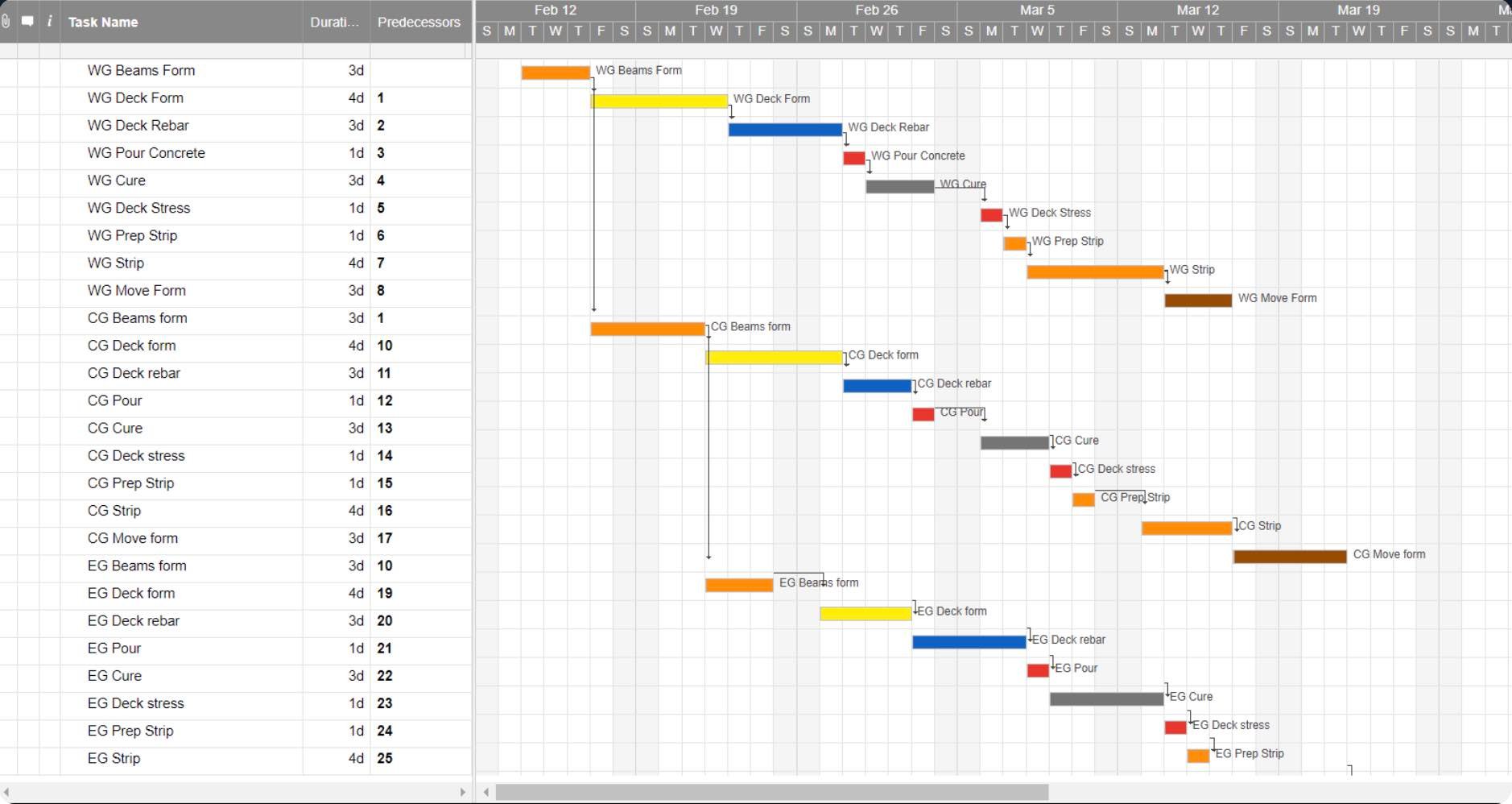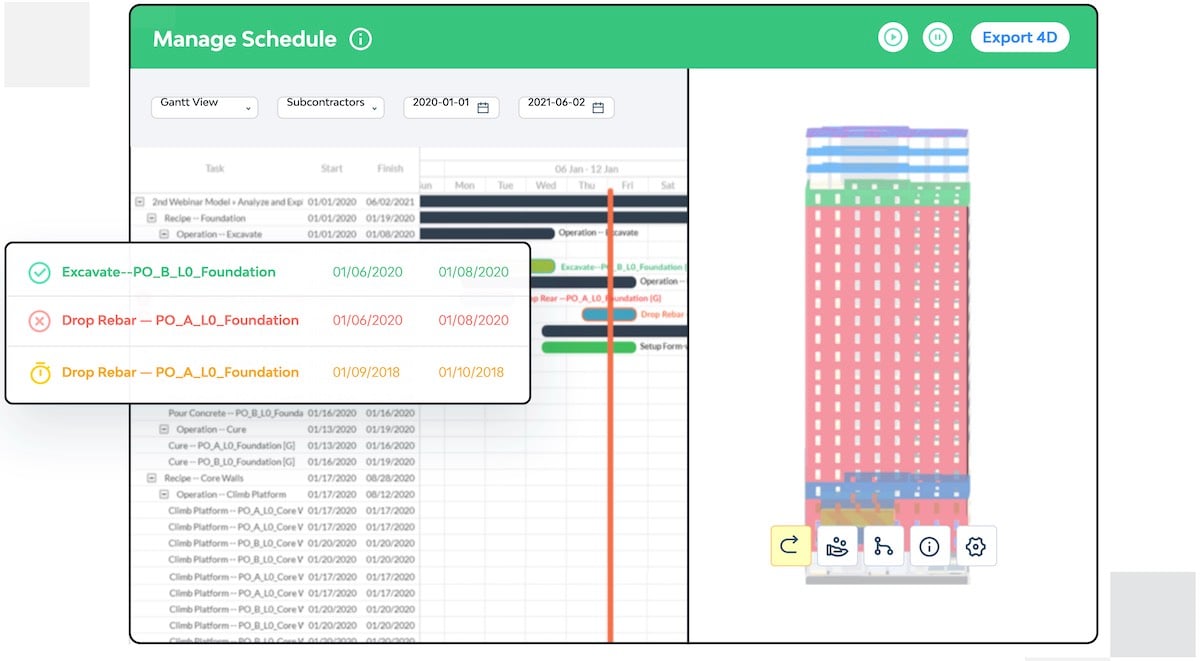Conquer Construction Project Delays
The cost of construction disputes has risen dramatically, weighing in at a staggering average of $54.26 million in 2021. As reported by independent consulting firm Arcadis, 75% of respondents stated they had encountered disputes or claims related to construction project delays, citing timely adaptation to site changes and schedule disruptions as being the most significant factors.
Construction delays are inevitable. Damages aren’t.
While construction project delays are sometimes inevitable, resulting claims and disputes can often be mitigated with development of a comprehensive project recovery plan.
Thorough construction project recovery planning should take into consideration the big picture, examining areas in which delays are most likely to occur, and accounting for potential impact to the construction timeline. By factoring in issues and risks most likely to affect project scheduling during the preconstruction phase, GCs can avoid costly construction delay damages and disputes which impact profitability - and their future credibility.
Construction Project Recovery Planning 101
Identify potential challenges.
At minimum, a practical project recovery plan requires an understanding of the issues most likely to result in construction project delays. Due to the complexity of large-scale builds, events which trigger changes to the construction timeline can vary greatly - as can the assignment of fiscal responsibility for delays. Whether caused by financial issues, unforeseen ground conditions, adverse weather, or labor and equipment shortages, considering the challenges most likely to arise can help GCs to proactively develop contingencies and workarounds during the preconstruction phase.
Categorize and prioritize critical delays.
Once a GC has identified and assessed potential challenges, they can be categorized by level of risk to the project, and prioritized accordingly. Issues that affect the construction timeline or postpone the project delivery date are most likely to trigger construction delay damages. Changes that may impose additional costs or unplanned expenses to the owner or contractor should also be included in the project recovery plan.
By proactively prioritizing possible critical delays, a comprehensive project recovery plan can help GCs envision and design effective recovery scenarios.
Use smart tools for construction project scheduling.
Many traditional scheduling and planning softwares rely on the Critical Path Method - but when it comes to project recovery planning, CPM tools are limited in both their flexibility and usefulness. Their reliance on rigid sequencing means that when things go awry (as they often do) the integration of even simple changes to the construction timeline requires project-wide reconfiguration - which is both costly and time-consuming.

Choosing the right tools and software to improve construction scheduling can streamline project recovery planning, and lay the groundwork for a successful large-scale build. Focusing on smart tools which reduce manual entry, improve project insight, and offer greater flexibility, accuracy, and adaptive ability will help you evolve to meet quickly changing conditions, and avoid incurring construction delay damages.
Manage your construction timeline proactively.
Despite thorough planning and preparation - in a complex system of moving parts, even slight deviations can result in significant construction project delays. Speedy adjustment and swift remedies are crucial in circumventing cascading effects, and avoiding complete derailment from the construction timeline. Proactive oversight and management of project progression is paramount; without constant attention to timely completion, even the most excellent project recovery plan is useless.
Expect the unexpected.
Some events are simply unpredictable. Labor strikes, natural disasters, resource shortages, government interventions, and concealed conditions are difficult to include in a project recovery plan - still, they can spell disaster for the unprepared. When even the best-laid plans fail, AI-driven software for construction project scheduling empowers GCs to adapt quickly to unpredictable occurrences - analyzing changing conditions and delays in real-time and incorporating new information to model the best pathway forward - realigning delayed projects at maximum speed.
Plan and prepare.
Proper scheduling and planning are critical to any large-scale project - but when it comes to project recovery planning, timing is everything.
A well-designed project recovery plan takes project scheduling, scope of work, financial obligations, resource management, and site details into consideration - and then scales out, identifying possible points of failure in order to predict and mitigate risk. Swift and precise action in the face of change is the only way to get your project back on track, and avoid accruing extensive damages.
ALICE Preconstruction helps you prepare for the worst-case scenario - first, by analyzing and assessing millions of scenarios to optimize for project cost and efficiency; then, by creating the most advantageous construction project schedule possible.
Unlike traditional scheduling tools, ALICE is driven by powerful, flexible AI - capable of identifying millions of pathways to completion. ALICE’s easy-to-use, adaptable tools reveal useful alternatives and auxiliaries specific to your unique project, with unconventional options for sequencing and resource allocation. These can be incorporated into the project recovery plan during the preconstruction phase - or reassessed as your project progresses, to inform new pathways forward.
Adapt, and take action.
Project success hinges on taking swift, decisive action in the face of construction project delays - but GCs can’t adapt if they aren’t informed. Without consistent, proactive timeline management, even the most excellent project recovery plan is useless.
ALICE Manage makes ongoing analysis simple and effective, so GCs can continually reassess project progression against the construction timeline, and optimize to compensate for construction project delays as they occur. Detailed project oversight enables proactive adjustment to current conditions. Complex amendments and updates to project scheduling and sequencing are accomplished with just a few clicks - eliminating the burdens posed by manual change assessment. And GCs are empowered to make critical changes on the fly, reducing the downtime which leads to construction delay damages.
Recover swiftly.
When faced with the challenge of getting a problem construction project back on track, having a comprehensive and considerate project recovery plan will save the day. Schedule your free demo to see how ALICE helps you avoid disputes and damages for delayed construction - and deliver your project in record time.
